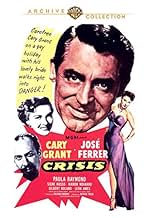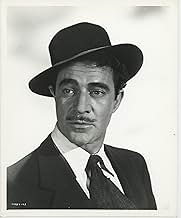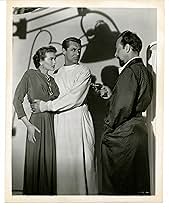AVALIAÇÃO DA IMDb
6,7/10
2 mil
SUA AVALIAÇÃO
Adicionar um enredo no seu idiomaWhile on vacation in a Latin American country, an American neurosurgeon and his wife become tangled in a revolutionary uprising against a tyrannical dictator.While on vacation in a Latin American country, an American neurosurgeon and his wife become tangled in a revolutionary uprising against a tyrannical dictator.While on vacation in a Latin American country, an American neurosurgeon and his wife become tangled in a revolutionary uprising against a tyrannical dictator.
- Direção
- Roteiristas
- Artistas
- Prêmios
- 1 vitória no total
José Ferrer
- Raoul Farrago
- (as Jose Ferrer)
Lillian Adams
- Nurse
- (não creditado)
Carlos Barbe
- Friend of Farrago
- (não creditado)
Orlando Beltran
- Doctor's Assistant
- (não creditado)
Audrey Betz
- Servant
- (não creditado)
George Brady
- Student
- (não creditado)
Robert Cabal
- Very Young Man
- (não creditado)
Andy Carillo
- Man at Table
- (não creditado)
Bridget Carr
- Guest
- (não creditado)
Teresa Celli
- Rosa Aldana
- (não creditado)
Carlos Conde
- Man
- (não creditado)
Rita Conde
- Pretty Woman
- (não creditado)
- Direção
- Roteiristas
- Elenco e equipe completos
- Produção, bilheteria e muito mais no IMDbPro
Avaliações em destaque
"Crisis" is a study in how a strong supporting cast can make a movie complete. While Grant and Ferrer give powerful performances, they are enhanced by even better performances by Signe Hasso and Ramon Navarro. The latter two, with subtle, understated characterizations, round out a thoughtful script and cast. The story is compelling -- medical/ethical conflict, interwoven with a political drama which doesn't attempt to sway. It does provide a backdrop which doesn't interfere but enhances.
CRISIS remains perhaps the only film that is completely forgotten when lists of Cary Grant films are offered. Even some of Grant's lesser vehicles are discussed, in depth, but Richard Brooks' CRISIS, which features a really stellar cast is 'lost' in contemporary cinema circles. There is no logical reason for this. Grant gives one of his very rare straight dramatic performances -- and one very very different from the dramatic range in NONE BUT THE LONELY HEART. It is a strong, forthright piece of work. The film deserves rediscovery for any number of reasons -- Grant's work, the first sign of Brooks' major talent... and one of the few (if only) Grant films that deals with modern political issues. I had remembered the film very well from my youth and never saw it listed for TV showings or any retrospectives. Thus, finding a rare DVD copy was wonderful ... and, surprisingly, very rewarding. Here's to someone pulling CRISIS out of obscurity and into a rung on the Cary Grant pantheon.
Fans of Cary Grant should see this under appreciated film. It proves that Grant could indeed act - and that he has far greater range than his standard light comedy fare would indicate.
This is not a great movie, but it is a very well made movie. It has high production values. The film features three of the major "Latin Lovers" from the Silent era - Gilbert Roland, Ramon Novarro, and Pedro De Cordoba.
Jose Ferrer and Signe Hasso play a Latin American Dictator and his wife. They are the weakest points in the production - Ferrer insists on "Acting" through every scene. His performance comes across as very dated and unbelievable. Hasso, normally a fine actress, comes across as wooden and barely lifelike.
The weakest point in the production is the script. It insists on being very "politcal" and this detracts from the enjoyment value. Yet, because of this political viewpoint, it treats Latinos with much more respect and consideration than other movies filmed during this era.
This is not a great movie, but it is a very well made movie. It has high production values. The film features three of the major "Latin Lovers" from the Silent era - Gilbert Roland, Ramon Novarro, and Pedro De Cordoba.
Jose Ferrer and Signe Hasso play a Latin American Dictator and his wife. They are the weakest points in the production - Ferrer insists on "Acting" through every scene. His performance comes across as very dated and unbelievable. Hasso, normally a fine actress, comes across as wooden and barely lifelike.
The weakest point in the production is the script. It insists on being very "politcal" and this detracts from the enjoyment value. Yet, because of this political viewpoint, it treats Latinos with much more respect and consideration than other movies filmed during this era.
This is Richard Brooks' first directorial effort. Examining the work half a century after it was made, the film presents a director who knows how to get the most from his actors through the written word and the way it is spoken. Three actors sparkle: Cary Grant, Jose Ferrer, and Signe Hasso.
Compare Cary Grant's acting in the Hitchcock vehicles and in this. Grant presents a maturity in his speech patterns that do not show up under Hitchcock's direction. I think much of the quality of the performances is probably due to the director who took his first film seriously--probably a lot more than he did in his later career.
All in all, this is a curious film--quite unusual in several ways compared to the average Hollywood products in the Fifties. Is it only a question of humanism winning over all evils? Or more?
Compare Cary Grant's acting in the Hitchcock vehicles and in this. Grant presents a maturity in his speech patterns that do not show up under Hitchcock's direction. I think much of the quality of the performances is probably due to the director who took his first film seriously--probably a lot more than he did in his later career.
All in all, this is a curious film--quite unusual in several ways compared to the average Hollywood products in the Fifties. Is it only a question of humanism winning over all evils? Or more?
I first saw this movie in 1950 when it was released. I thought it was a good drama, more or less accurately portraying many of the problems of Latin American governments, with good dialog particularly between the two male leads. Incidentally, I did not find either character particularly sympathetic, but no matter. Many of the comments here have mentioned the resemblance to Eva Peron of the Signe Hasso character. Just an interesting observation: In the much later made for TV movie, Evita Peron, Signe Hasso and Jose Ferrer both had roles. He was the tango singer who seduced Evita and took her to Buenos Aires. She was the aging actress who befriended the young Dva Duarte and found herself in a jail cell. Of the two movies, Crisis is by far the better film. Evita Peron was a ripoff.
Você sabia?
- CuriosidadesOriginally banned in Mexico, Central and South America.
- Erros de gravaçãoThe doctor announces his fee is ten percent of the patient's income, but does not say whether this means monthly, annual or some other period.
- Citações
Raoul Farrago: At least permit me to thank you. You have done a great service not only to me but to the people of my country.
Dr. Eugene Norland Ferguson: I only saved your life I didn't vote for you.
Raoul Farrago: Neither did they.
[smiling]
- Cenas durante ou pós-créditosPROLOGUE: "The time is now. The scene of the action is fictitious, but the forces at play in this story are not fictitious."
- Versões alternativasAlso available in a computer colorized version.
- ConexõesReferenced in Secret Publicity - Forbes Taylor Remembers the Making of State Secret (2021)
Principais escolhas
Faça login para avaliar e ver a lista de recomendações personalizadas
- How long is Crisis?Fornecido pela Alexa
Detalhes
Bilheteria
- Orçamento
- US$ 1.616.455 (estimativa)
- Tempo de duração
- 1 h 35 min(95 min)
- Cor
- Proporção
- 1.37 : 1
Contribua para esta página
Sugerir uma alteração ou adicionar conteúdo ausente

































